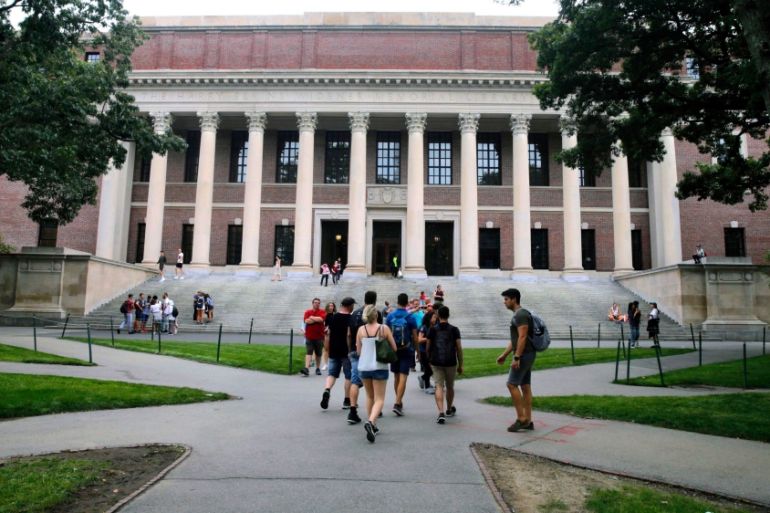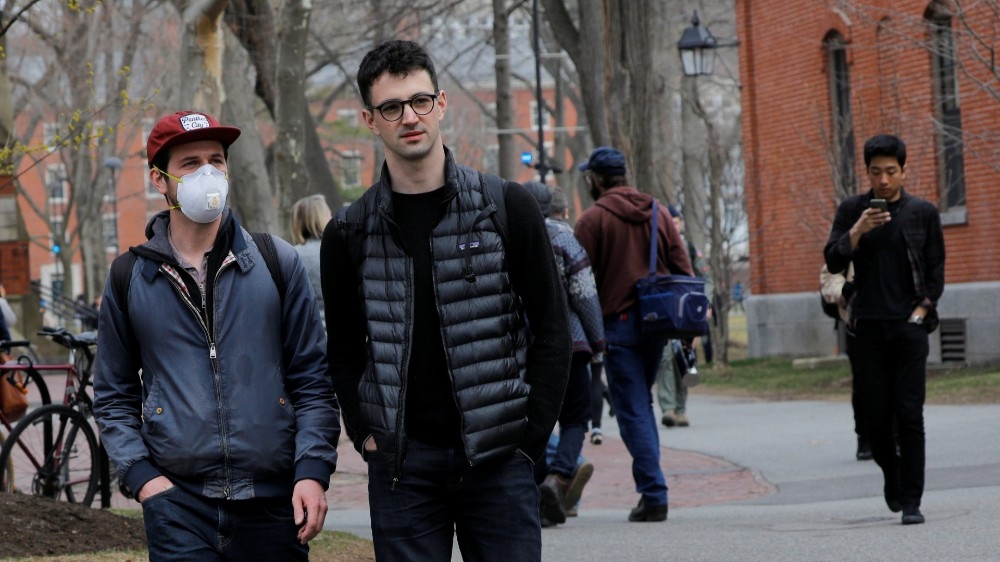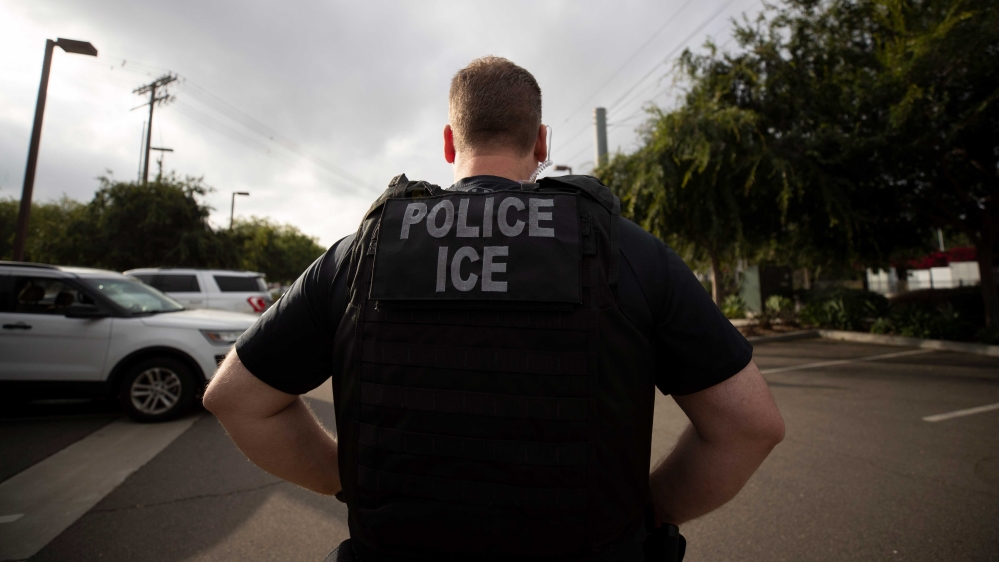Over 200 universities, 17 US states sue over foreign student rule
The Department of Homeland Security says the policy is backed by existing law and still provides leniency.

Seventeen US states and more than 200 universities are taking legal action to challenge the Trump administration’s new restrictions on international students, arguing that the policy jeopardises students’ safety and forces institutions to reconsider new plans for the coming semester that they have spent months preparing.
The universities have signed court briefs supporting Harvard University and the Massachusetts Institute of Technology (MIT) as they sue US Immigration and Customs Enforcement (ICE) in federal court in Boston. The lawsuit challenges a recently announced directive saying international students cannot stay in the United States if they take all their classes online in the coming academic year.
Keep reading
list of 4 itemsInternational students risk immigration status to engage in Gaza protests
The misogyny of the anti-protest
California university will heed student call to boycott Israel institutions
On Monday, 17 states and the District of Columbia filed their own lawsuits, arguing the rule is politically motivated and an attempt by the Trump administration to force universities to hold in-person classes when classes resume in the autumn.
“The Trump administration didn’t even attempt to explain the basis for this senseless rule, which forces schools to choose between keeping their international students enrolled and protecting the health and safety of their campuses,” Maura Healey, the Massachusetts attorney general, said in a statement announcing the suit.
Other suits have come from Johns Hopkins University and the state of California. The University of California system has said it will sue.

A judge is scheduled to hear arguments on Tuesday in the case brought by Harvard and MIT. If the judge does not suspend the rule, colleges across the US will have until Wednesday to notify ICE if they plan to be fully online when classes start in August or September.
Legal questions
The Department of Homeland Security and ICE said the new policy is backed by existing law forbidding foreign students from taking all of their classes online. ICE suspended the rule in March in response to the pandemic, but the agency told universities it was subject to change, according to a Monday court filing from the Trump administration.
The agencies said their updated guidance still provides leniency by allowing foreign students to maintain their visas even if they study online from abroad in the coming fall semester.
“Rather than completely rescinding the March guidance and reverting to business as usual with respect to schools and foreign students, ICE announced a measured transition to begin a move toward reopening schools and allowing students to return to classrooms,” the brief said.
A brief filed on Monday by 59 universities, however, said the rule throws their plans into disarray with some due to start the new academic year in less than a month. They challenged the policy’s legal grounds and said it forces institutions across the nation to “choose between opening their campuses regardless of the public health risks, or forcing their international students to leave the country.”
The group includes all the so-called Ivy League universities as well as other prestigious universities like Stanford and Duke, which together have more than 213,000 international students.

“These students are core members of our institutions,” they wrote. “They make valuable contributions to our classrooms, campuses and communities – contributions that have helped make American higher education the envy of the world.”
The colleges are asking the court to block the rule as quickly as possible, saying it is already being used to turn students away. Last Wednesday, a DePaul University student was prevented from entering the country after arriving in San Francisco, according to the filing. Harvard previously said one of its students from Belarus was turned away from a flight at an airport in Minsk last week.
If the policy is upheld, universities could be forced to reconsider their new term plans. Princeton last week said first-year students and juniors could live on campus during the first semester, while more senior students would replace them in the following term. But that plan was based on the understanding that foreign students could continue remote learning from the US, the filing said.
“Princeton now may be forced to reassess its plan, with just weeks to go before the fall semester, lest sophomore and senior international students be forced to leave the country – and potentially be unable to return for the spring,” according to the brief.
A separate coalition of 180 colleges filed a brief saying that colleges were “blindsided” by the policy. The group, known as the Presidents’ Alliance on Higher Education and Immigration, said it was a reversal of a March 13 directive from ICE that waived limitations around online education for foreign students “for the duration of the emergency”. They point to data suggesting the number of new coronavirus cases in the US is higher now than it was in March.
“All seem to agree the emergency remains ongoing, but ICE’s policy has inexplicably changed,” the group wrote.
The directive also stands to hurt colleges financially, the group wrote. International students typically pay the highest tuition rates and rarely are eligible for scholarships. The alliance said many colleges risk losing millions of dollars over the policy, including Northern Virginia Community College, which estimated it could lose nearly $10m in tuition from foreign students.
‘Crippling consequences’
A separate brief filed by the Princeton Theological Seminary said the policy would bring “crippling consequences” from a funding perspective. The seminary said its international ties include many foreign donors who would find the guidance “such a shocking affront that PTS’ relationships with those donors may never recover”.

The suit has also been backed by 26 cities and counties that said the policy would damage their economies. Those range from New York City, which said international students contribute three billion dollars a year to its economy, to Iowa City, Iowa, which said its 2,500 resident international students contribute millions of dollars a year.
Briefs of support have also been filed by scientific associations, student governments, education unions and 71 higher education associations.
Under the new rule, international students would be forced to leave the US or transfer to another college if their schools operate entirely online for the fall semester. New visas will not be issued to students at those schools, ICE said, and others at schools offering a mix of online and in-person courses will be barred from taking all of their classes online.
It would apply even if an outbreak forces schools to shift classes entirely online mid-term, according to the guidance.
The policy was issued the same day Harvard announced that its first-years would be invited to campus but that all undergraduate classes will be held online.
The suit from Harvard and MIT argued that ICE issued the policy without offering any justification and without allowing the public to respond. It also said the agency is breaking from its March 13 promise to provide flexibility during the pandemic.